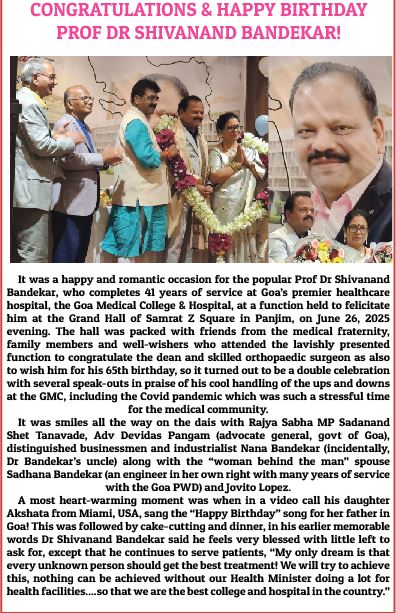Goa is abuzz with excitement as vintage bike and car owners, users, collectors and fans are decking […]

LETTERS TO THE EDITOR FOR ISSUE DATED JUNE 28, 2025
June 28- July 04, 2025, Letters To The Editor June 27, 2025FRAUDULENT SOCIAL WELFARE BENEFICIARIES
THE candid revelation by Social Welfare Minister Subhash Phaldessai that 10% of the beneficiaries under the Dayanand Social Security Scheme (DSSS) are bogus, including those ineligible, comes as no surprise. The very proactive Subhash Phaldessai must clear the rot that over the years has creeped into the system, obviously with political blessings.
In 2001 when the Dayanand Social Security Scheme (DSSS) was launched, very high-handedly the application forms were available only with ministers and ruling MLAs who started distributing them on their birthdays. As this was a public scheme, I was constrained to immediately move the High Court, which directed that the application forms be made available to the public at the offices of all the Mamlatdars.
It is imperative that the certifying of eligibility for any social welfare schemes should be by revenue authorities and not by an MLA or MP. It is on account of this that hundreds of fraudulent and ineligible persons managed to get themselves enrolled as beneficiaries of public schemes they were not entitled to. Welfare schemes are meant to benefit the truly poor and needy while not being misconstrued as largesse of the political party in power.
—Aires Rodrigues, London

SO ISSUE INSURANCE POLICY WITH ATM/DEBIT CARDS
IN case it is a matter of fact that debit or ATM cards themselves don’t inherently come with insurance, but many banks offer complimentary insurance covers as part of their debit card offerings. This insurance can include benefits like accidental death or disability cover, purchase protection, and more. The specific coverage and benefits will vary depending on the bank and the type of debit card. So the relevant banks should issue insurance policy certificate while delivering ATM/ DEBIT cards for the awareness of the policies, as most of the customers are unaware of the fact.
Many debit cards offer a personal accident cover, providing financial support in the event of accidental death or permanent disability.
Some cards offer purchase protection, covering the cost of items purchased with the card if they are damaged, stolen, or lost within a certain period. Some banks offer protection against fraudulent charges made if the card is lost or stolen.
Debit card insurance is often a group policy, meaning it’s a broader policy offered by the bank, rather than individual policies for each cardholder.
The claim process typically involves informing the bank about the incident and providing the necessary documentation. While many banks offer complimentary insurance, it’s not universally offered with all debit cards. Some cards may require an additional fee or be part of a premium package to include insurance benefits. Insurance policy executor banks must issue policy certificate to the ATM/ DEBIT cardholders. If not, issue negative certificate for zero transaction of insurance policy to clear the doubt stakeholders.
—Rajesh Banaulikar, Veigaswado, Arpora















